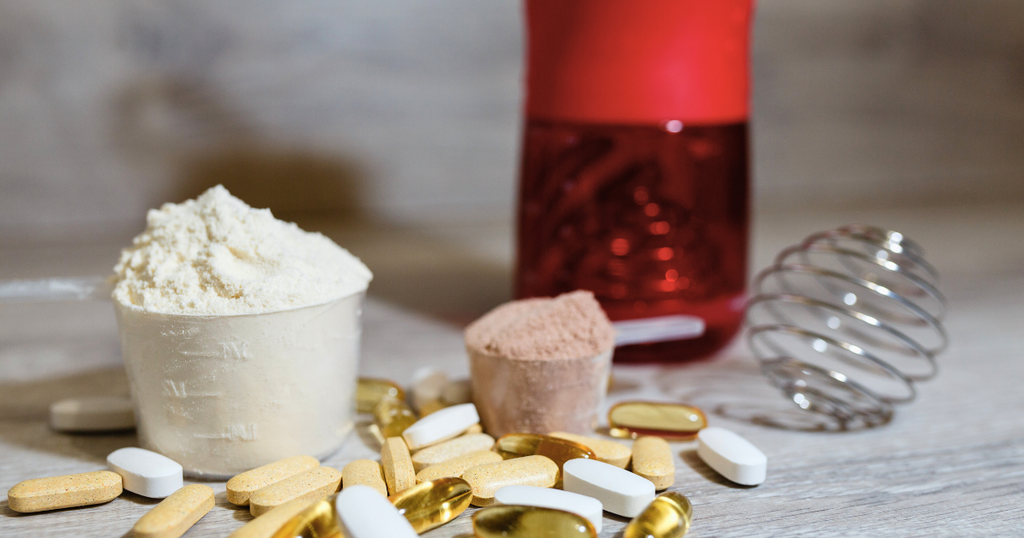
Pre-workout Supplements for Men: What Does It Do and Do You Need It?
Discover the benefits, ingredients, and effects of pre-workout supplements for men. Learn if pre-workout is right for your fitness goals and how it can enhance your exercise routine.
| Table of Contents |
Introduction
Pre-workout supplements have become a staple for many athletes and fitness enthusiasts aiming to maximize their athletic performance. Many are tailored specifically to men with a keen interest in health and fitness.
Pre-workout supplements promise to boost energy, enhance endurance, and support muscle recovery. But what exactly are these supplements, and are they a necessary part of your fitness routine?
This article looks closely at the world of pre-workout supplements, specifically those made for active men, shedding light on their potential benefits, key ingredients, and suitability for different goals. If you've been asking yourself, "What's in pre-workout supplements?" and "Do I really need a pre-workout?"— then you've arrived at the right place.
Understanding the Basics of Pre-workout Supplements

Pre-workout supplements are designed to enhance physical and mental performance, energy, and focus during workouts. They do this by providing energizing ingredients, often including caffeine, and nutrients such as amino acids that help to power muscles and improve strength.
While each pre-workout mix is different, they are typically consumed about 2 to 30 minutes before exercising, which gives the body enough time to digest the nutrients. They come in various forms, including powders, pills, and ready-to-drink beverages.
What does pre-workout do? Functions and Potential Benefits
The primary goal of using a pre-workout supplement is to prepare the body and mind for the rigors of a workout, enabling people to push harder and for longer.
Compared to protein powders and other dietary supplements, pre-workout is a supplement category specifically designed to support and enhance physical performance and endurance. Whether you're lifting weights, running, or engaging in high-intensity interval training (HIIT), pre-workout supplements can provide enhanced performance and an extra "edge," such as by making you feel more alert.
Potential benefits of pre-workout products:
-
Can help boost energy: By stimulating the central nervous system, such as with caffeine, research suggests that a pre-workout mix can help you feel more energetic and ready to tackle your workout.
-
Helps increase focus and alertness: Ingredients in pre-workouts can improve concentration and motivation, making it easier to stay on task.
-
May enhance endurance and performance: With improved blood flow and energy supply, you may find that you can exercise longer and more intensely when you take a pre-workout before exercising, such as one that contains nitric oxide and B vitamins that support circulation. Many studies have concluded that pre-workouts support endurance and performance during different types of workouts.
-
Supports muscle growth and recovery: Certain ingredients support muscle synthesis and recovery, aiding in faster strength gains and potentially reducing soreness following workouts.
What's in Pre-workout Supplements?
As you can probably tell, most pre-workout supplements often contain a blend of ingredients that are meant to synergistically improve athletic performance and contribute to fitness goals, such as getting stronger or boosting stamina.
Before adding any new supplement to your routine, it's a smart idea to do your research and understand what's inside of it, as well as its intended uses. Not all supplements are created equal, and knowing what to look for in a pre-workout supplement can help you choose the best option for your needs.
Key ingredients commonly found in pre-workout formulas:
-
Caffeine: A central nervous system stimulant that boosts energy levels and alertness.
-
Beetroot: Rich in nitrates, beetroot enhances blood flow, improving oxygen and nutrient delivery to muscles.
-
Electrolytes: Essential for hydration and muscle function, electrolytes include potassium, sodium, and magnesium, which can help prevent muscle cramps, spasms, and fatigue.
-
Beta-alanine: This compound is known for its role in reducing muscle fatigue and increasing endurance.
-
Creatine: Supports energy production in muscles, enhancing performance and muscle growth.
-
L-citrulline: Increases nitric oxide production, potentially enhancing endurance and muscle recovery.
-
L-arginine: A precursor to nitric oxide, it helps boost blood flow, which can improve workout performance and muscle pump.
-
Taurine: Acts as an antioxidant and may improve exercise performance by reducing fatigue and muscle damage.
-
Tyrosine: An amino acid that is believed to improve mental focus and alertness, particularly in stressful situations or when fatigued.
-
Vitamin B12 and B3: Can boost energy levels and improve blood flow.
Different Forms of Pre-workouts

For the best results when using a pre-workout, choose a product based on your preferred form. Pre-workout supplements are available in several forms, including:
-
Powders: Mixed with water, they are the most common and customizable options.
-
Pills/capsules: Convenient for those who prefer not to drink their supplements.
-
Ready-to-drink formulas (bottled beverages): Ideal for on-the-go convenience, though often more expensive.
Do You Really Need a Pre-workout Supplement?
People have been exercising for most of history without taking pre-workout supplements. So no, even with high intensity exercise, you don't necessarily need a pre-workout product. But using one does have advantages and may take your fitness abilities to the next level.
Whether you should use workout supplements depends on your fitness goals, health status, and diet preferences. Consider the following when deciding if a pre-workout product is right for you:
-
Your fitness goals: If you're looking to increase the intensity and duration of your workouts, adding in a pre-workout can be beneficial. If you exercise moderately and aren't pushing yourself too hard, then you may not need a pre-workout, especially if it tends to make you feel anxious or hurts your stomach.
Potential Side Effects of Pre-workouts:
These side effects can vary depending on the specific ingredients and individual tolerance levels, but some common potential side effects of pre-workout supplements include:
-
Caffeine-related effects: Many pre-workout supplements contain high levels of caffeine, which can lead to jitteriness, nervousness, increased heart rate, and difficulty sleeping (insomnia). Excessive consumption of caffeine can also cause dehydration and increased blood pressure.
-
Gastrointestinal issues: Certain ingredients, such as creatine or beta-alanine, may cause gastrointestinal discomfort, including nausea, diarrhea, or stomach cramps in some individuals.
-
Increased heart rate and blood pressure: Stimulants like caffeine can elevate heart rate and blood pressure, which may pose risks for individuals with pre-existing cardiovascular conditions.
-
Dependency and tolerance: Regular consumption of pre-workout supplements containing stimulants like caffeine can lead to tolerance, where individuals require higher doses to achieve the same effects. Additionally, dependence on pre-workout supplements for energy and performance enhancement may develop.
-
Allergic reactions: Some pre-workout supplements contain ingredients that individuals may be allergic to. It's essential to check the ingredient list carefully, especially if you have known allergies.
-
Insomnia and sleep disturbances: The stimulating effects of pre-workout supplements, particularly those containing caffeine, can disrupt sleep patterns, leading to insomnia or poor sleep quality.
-
Dehydration: Certain ingredients, such as caffeine and diuretics, can increase urine output and contribute to dehydration if adequate fluid intake is not maintained during exercise.
-
Nervousness and anxiety: High doses of stimulants like caffeine may exacerbate feelings of nervousness, anxiety, or restlessness in some individuals.
-
Headaches: Some individuals may experience headaches or migraines as a result of certain ingredients or dehydration caused by pre-workout supplements.
-
Tingling sensation (paresthesia): Beta-alanine, a common ingredient in pre-workout supplements, can cause a harmless tingling sensation on the skin known as paresthesia. While not dangerous, it can be uncomfortable for some individuals.
It's important to note that not everyone will experience these side effects, and individual tolerance levels can vary widely. Choosing the right pre-workout is crucial.
Consider your tolerance to stimulants like caffeine and check for balanced ingredient profiles that align with your fitness goals. It's essential to prioritize products with ingredients that suit your body and desired outcomes for a safe and effective workout experience.
Alternatives and Ways to Boost Pre-workout Effects
A well-balanced diet, adequate hydration, and proper sleep can significantly enhance workout performance without the need for supplements. Therefore, even if you do plan to use a pre-workout, make sure you cover the basics as well and take care of yourself — including by eating well and getting enough rest.
If you don't tolerate pre-workouts well, consider trying these strategies instead:
-
Coffee or green tea: Both are natural sources of caffeine, providing a similar energy boost to pre-workout supplements. Coffee can enhance alertness and performance, while green tea offers the added benefit of antioxidants and is lower in caffeine for those who are sensitive to it.
-
Bananas: Rich in carbohydrates and potassium, bananas are an excellent source of natural energy and help in maintaining nerve and muscle function during workouts.
-
Beetroot juice: Beets are high in dietary nitrates, so beetroot juice can help boost blood flow and oxygen delivery to muscles, enhancing endurance and reducing the amount of oxygen your muscles need during exercise.
-
BCAA (Branched-Chain Amino Acids): Although not a direct substitute for the energy boost, BCAAs can support muscle recovery and growth when taken before a workout. They may also help in reducing exercise fatigue.
-
Water with a pinch of salt and lemon: Hydration is key for optimal performance. Adding a pinch of salt and lemon to your water can provide electrolytes, including sodium, that may lead to a mild energy boost.
FAQs About Pre-Workout Products
Q: Can pre-workout supplements cause side effects?
A: Yes, it's possible for pre-workouts to disagree with some people, depending on the exact ingredients and the user's sensitivity. Potential side effects can include jitteriness, insomnia, and digestive issues such as stomach pains. If you experience these effects, try a different product, a lower dosage, or stop using them altogether.
Q: How often can I take pre-workout?
A: It's best to use a pre-workout on days when you need an extra energy boost for your workout. Avoid daily use to prevent tolerance build-up and ensure your body responds well to its ingredients.
Q: Are there natural alternatives to pre-workout supplements?
A: Yes, as mentioned above, foods rich in caffeine, nitrates, amino acids, and electrolytes can serve as natural pre-workout boosts. This includes coffee, tea, fruits, vegetables, protein powders, and electrolyte drink mixes.
Key Takeaways on Pre-workout Supplements for Men

Pre-workout supplements can be a valuable addition to your fitness regimen, especially if you're looking to enhance your athletic performance, endurance, strength, energy, and muscle recovery. By making informed decisions about dietary supplements, and considering your personal fitness goals and health status, you can effectively incorporate pre-workout supplements into your routine to experience improvements in your fitness abilities more easily.
-
Pre-workouts offer potential benefits such as increased energy, improved focus and alertness, enhanced endurance and performance, and support for muscular endurance and recovery.
-
Common ingredients found in pre-workout formulas include caffeine, beetroot, electrolytes, beta-alanine, creatine, L-citrulline, and others, each with specific roles in boosting workout performance.
-
While pre-workout supplements can be beneficial for some individuals, they may also come with potential side effects such as caffeine-related effects, gastrointestinal discomfort, increased heart rate and blood pressure, and dependency.
-
Natural alternatives to pre-workout supplements include coffee, green tea, bananas, beetroot juice, BCAAs, and hydration strategies, which can provide similar benefits without the risk of side effects associated with some supplements.



